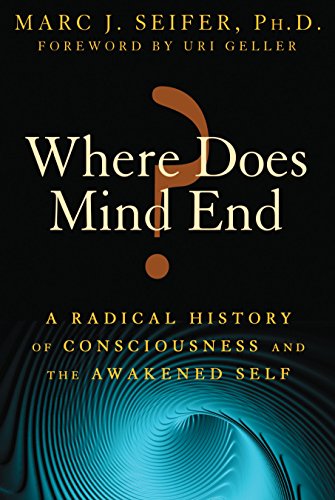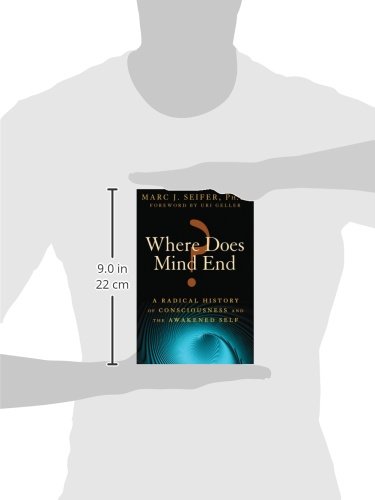


Full description not available
S**V
AN AMAZING READ! LEARN ABOUT WHAT THESE GREAT THINKERS KNEW
More about Tesla [yes Tesla!] and other great thinkers who have shaped our modern world! A wild ride through time and space. Someone should give Dr. Seifer a huge pile of grant money to start the studies to the levels he suggests...it is too bad that no one has the courage to do it! Understanding where the mind fits in the realm of time and space will take us into the dimensions of the future, where we can travel to other worlds in ways we can't conceive of today!
J**N
Where Does mind End
If you are looking for a book on the profound question of consciousness, or the highest states of consciousness this is not the book for you. The book starts off good by talking about some of the early philosophers, but then goes into rants about how bad Reagan, Palin and Bush were and how great the democrats were. It does go into the works of Freud and the ego, superego and id, but never really gets to the deeper questions of the mysteries of consciousness and the brain. I got up to page 260 where it continued to rant about Bush, Kennedy, the Cuban missile crisis, Reagan, Afghanistan, etc. and I stopped there. Back to Amazon with this one.
S**R
Where does mind end
I am building a library for myself and am collecting books for the library that I will have some day. This is one such book. I haven’t read it yet but I think it will be fascinating and am looking forward to reading it.
C**N
Download could b better! Excellent writer
Love the book !!! But e other page missing on my kindle 25 percent through????
C**S
Five Stars
Points out the important relationship of psychology, consciousness and related issues not taught
T**N
Profound questions
The title of Marc Seifer's new book starts the reader right off with a profound question: Where Does Mind End? In Uri Geller's introduction, he at least answers the question of where the mind begins, and that is, of course, with the self. Thus, he leads the reader to consider the greater and more difficult question, namely, how does one access the higher dimensions? Certainly, it is through the self, and Seifer's book provides a roadmap.Eschewing an atheistic or "politically correct" paradigm, Seifer aligns himself with a holographic view, which is in accord with Leibniz' monad theory, namely that the part reflects the whole, that the ability to be conscious must stem from some larger "consciousness" responsible for the creation and/or directionality of the world.Where many psych or New Age books tend to marginalize Freud, Seifer goes whole hog into the true majesty of Freud's model of a conscious, preconscious and unconscious. Using numerous examples, Seifer shows how the Freudian model accounts not only for our actions, but also their ramifications. Freud drives home that idea that we not only have an unconscious, but that this unconscious THINKS, and further, since it is linked to the animalistic id, if we mishandle these powerful unconscious forces, e.g., our sex and aggressive drives, we not only encounter conflict, we may also, through stress and psychosomatic illness, shorten our lives.As proof to this theory, Seifer suggests that there is a reason why great artists tend to live long lives (both Picasso and Marc Chagall made it into their 90's). Yes, there are many exceptions to this rule, but the point is that the better we understand the unconscious and the irrational id, the more likely we are to lead productive and creative lives.However Seifer doesn't stop there, rather, he devotes the last quarter of the book to Will Psychology, particularly the theories of Tony Robbins on the cause and cure of simple depression, Gurdjieff on self-evolution and how to become master of one's ship and the Dalai Lama on right living. This is a worthy book filled with insights from the greatest minds of the last 2500 years. I found myself re-reading many passages because they were quite thought provoking.
D**E
Review: Where Does Mind End?
Marc Seifer must enjoy an enthusiastic response from his students at RogerWilliams University in Rhode Island. Where else could you find the breadthof topics covered in WHERE DOES MIND END? Usually, academics are constrained byall the normal prejudices that accompany unusual topics like hypnosis, chi,kundalini, tarot and the history of the occult--topics fascinating to manybut not generally explained in the context of the history of philosophy andpsychology. Yet Mr. Seifer doesn't hesitate to examine these and othercontroversial topics in a way that illuminates their meaning in relation tomore historically accepted disciplines--many of which he also examines insimple, clear terms--such as Greek philosophy, psychoanalysis and otherpsychological systems--as well as modern political thought. I cannot butadmire his willingness to expand on such a variety of themes within theconfines of one text.In the same manner, Seifer also juxtaposes profiles of historical figuressuch as Sigmund Freud, Carl Jung and the Russian mystic Ivanovitch Gurdjieff withcontemporary personalities like Uri Geller, Tony Robbins and the Dalai Llama.What results is that WHERE DOES MIND END? becomes a composite of what mightbe called an overview of the "miraculous" potential of the mind to transformourselves and the world we live in. Each researcher Mr. Seifer profilesdemonstrates what it means to reach beyond conventional thinking andconstraints and venture into unknown territory. I can't but admire anyeducator that is willing to expend such a large amount of time and energy,as it is obvious Mr. Seifer has done, to make so many unusual individuals,topics and mysteries palatable to the curious reader. Five Stars for the effort andimaginative courage taken to broaden our intellectual horizons!Duncan Laurie
Trustpilot
2 months ago
2 weeks ago